If your raspberry plant is dying, it can be upsetting and frustrating. No one wants to lose any plant, much less one that produces such delicious fruit! But luckily, most problems that plague raspberry plants can be fixed. So read on to find out why your raspberry bush might be dying, and what you can do about it.
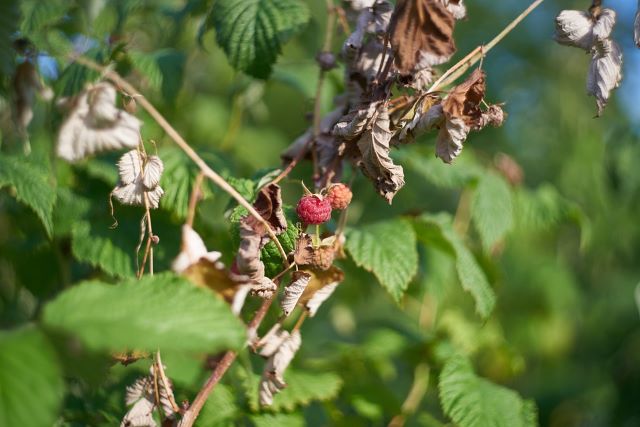
Signs of a dying raspberry plant can be due to the raspberry canes being too young or too old, watering problems, incorrect soil pH, too much fertilizer, not enough sunlight, pests and diseases.
Let’s look into each cause and find out the solutions to the problems you can be back to having delicious, home-grown raspberries.
Related: 8 Raspberry Pests and How to Get Rid of Them!
Table of Contents
1. Raspberry Canes Are Too Young Or Too Old
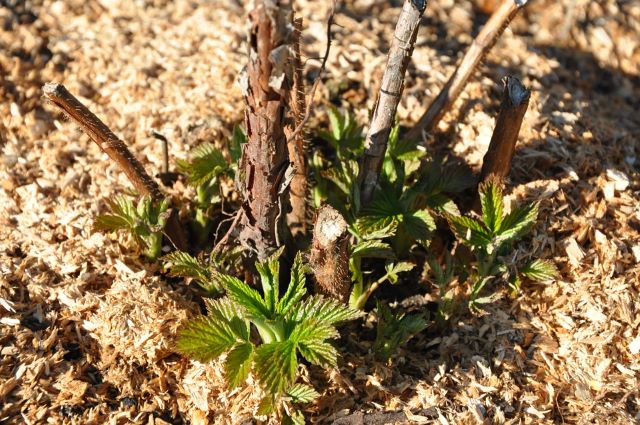
Raspberries don’t produce berries constantly. They have cycles of when they produce fruit and only produce at specific times in their lifespan. So it’s important to know two things: the type of raspberry plant you have and the age of its canes (the “branches” of the plant).
First, there are two main types of raspberries: summer-bearing and everbearing. Summer-bearing plants don’t produce until their second year, while everbearing plants will produce twice; once in late summer/early fall of their first year and again in the summer of their second year.
It’s also important to know the age of your raspberry canes. Canes that are in their first year are called primocanes, while canes in the second year are floricanes.
In summer-bearing varieties, only floricanes produce fruit. So if your plant is still young and only has primocanes, it’s not dying, it’s just not producing fruit because it’s too young.
For ever-bearing raspberries, the primocanes produce in the fall of the first year, and then turn into floricanes which produce the next summer. This variety produces much more in its lifetime.
Once a floricane produces raspberry fruit, it won’t produce again. As such, it’s best to prune floricanes away at the end of the growing season, to make room for new primocanes to grow. If your raspberry canes are too old, they won’t produce fruit.
Raspberry plants can live up to 15 or even 20 years, although some don’t produce for longer than about 10. So if your raspberry plant is quite old, that could also be why it’s dying. It could be time to replace the berries, either with cuttings from other raspberry plants, by buying new ones or growing raspberries from seed.
To prevent all of your raspberries from getting too old at once, you could stagger when you plant them, only planting a couple of new ones every year. This way, you can have a harvest every year!
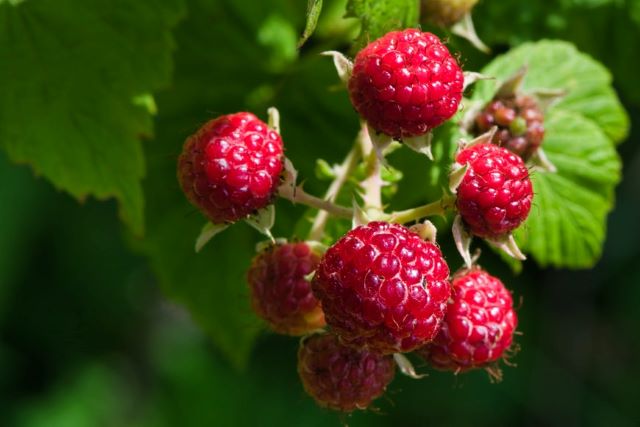
2. Raspberry Plant Watering Issues
Whether it be too much water or too little water, it can be easy to not give raspberry plants the watering they need.
Too little water is obviously bad. Dehydrated raspberry plants will start to wilt and then dry out, eventually dying. If your raspberry’s leaves are wilted and starting to dry, check the soil. If it’s dry, they need more water.
On the other hand, watering too much can cause problems. If too much water sits in the soil, root rot can take hold of the raspberry plant, which can be fatal. The symptoms of root rot look very similar to the symptoms of dehydration, so you have to determine water levels by checking the soil.
Dig your finger a couple of inches into the soil. If it’s dry or nearly dry, give your raspberry plants water. If it’s still pretty wet, hold off for now so you don’t give them too much.
Additionally, it’s best to water your raspberry bushes in the morning, so that the water has time to work into the soil before being evaporated in the heat.
If your raspberry plants are dehydrated, there’s an easy fix: water them! If root rot has taken hold, it might be too late for the plants. Hold off on watering them for a while, but if that doesn’t work, you might have to replace your raspberries.
3. Raspberry Soil pH Levels Are Incorrect
Raspberry plants, unlike many other plants, like soil that is slightly acidic. Their ideal pH range is from 5.6 to 6.2. If it strays outside of this range, they might struggle, and too far in one direction can be fatal to raspberries.
There is no way to accurately know the pH of your soil without testing it. Buying a pH testing kit, like this one, is the best way you can find out if your soil is balanced right for raspberries. If your pH is off, there are some ways you can fix it with organic methods.
If the pH is too low (very acidic) and you need to raise it, you can add limestone or baking soda to the soil. Limestone will raise the pH of the soil for a long time, making it great for long-term planning for your raspberries. Try out this lime blend fertilizer for a good organic option.
Baking soda will act faster than limestone, so is good for a quick fix. However, it doesn’t last as long, so limestone is still a better option in the long run.
Alternatively, if the pH of your raspberry’s soil is too high (basic) and needs to be lowered, you can add an organic natural soil acidifier such as this one to your soil. This is an organic fertilizer that is great at lowering soil pH.
4. Too Much Fertilizer For Raspberries
Obviously, raspberries benefit from fertilizer and often need it. A nice, organic compost can be really good for the growth of your raspberry plants. But if you apply too much fertilizer, it can actually be damaging.
Often, the first sign that raspberry plants have too much fertilizer is the leaves turning brown. As the issue continues, the rest of the plant will begin to die as well. So if your raspberry’s leaves are browning and you’ve been applying a lot of fertilizer, it could be that you’ve been giving too much.
Usually, raspberries only need four to five pounds of fertilizer for every 100 feet of soil. So if you have a smaller garden, you won’t need much at all. Try to avoid providing more than this ratio.
If you have over-fertilized your raspberries, it’s not too late. The best thing you can do is flush the raspberry plants. Give them a heavy watering to help the excess nutrients drain from the soil. If you need to repeat in a few days, you can.
Just remember to be careful: you don’t want to overwater your raspberries. Make sure the soil drains well so the excess water and nutrients aren’t just sitting in the soil.
5. Not Enough Sunlight For Raspberry Plants
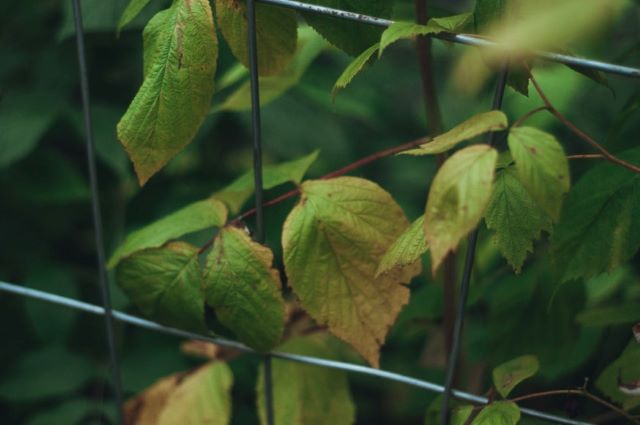
Raspberry plants like full sun, which means at least 6-8 hours of direct sunlight every day. If they get less than this, they might start to suffer or even die.
The most common reason raspberries don’t get enough sun is because of where they’re planted. If you plant them in a corner by your house, or somewhere else with tall walls, those walls might block the necessary sunlight.
Related: Can Raspberries Grow Under Fruit Trees?
Additionally, other plants or even trees can prevent raspberry bushes from getting direct sunlight. Try to make sure that your raspberry plants aren’t being blocked by anything in the area.
And once again, that’s 6-8 hours of direct sunlight. This means not partial shade or filtered light, but direct light onto your raspberry plants. If they aren’t getting this, you might need to find them another location or clear the area of other plants that could be getting in the way.
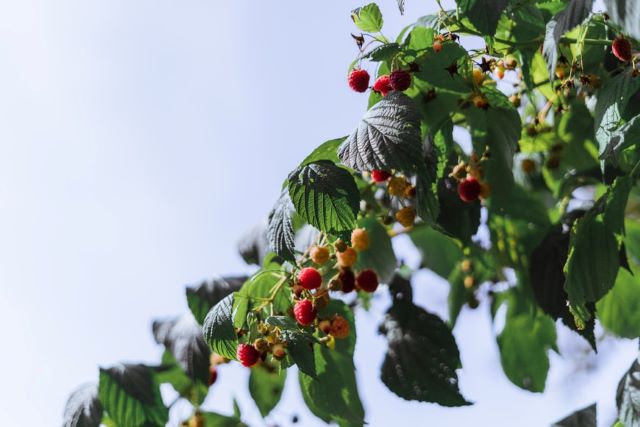
6. Raspberry Plant Diseases
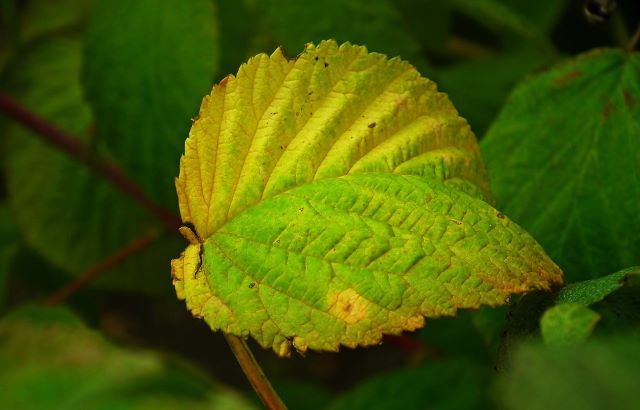
Raspberry plants can be prone to diseases, especially fungal ones. If you can, buy disease-resistant varieties to help keep your berries healthy. Additionally, try to avoid getting the leaves wet as much as possible, and don’t let the soil sit with too much water, as both of these things can encourage fungal diseases.
Cane Blight
Cane Blight is one of the most common raspberry plant diseases. It is fungal, and shows up as dark black or purple spots on the raspberry canes (called cankers). You may also see tiny black spores, which is how the disease spreads.
The methods mentioned above can help prevent cane blight. If it does take hold, you need to remove the infected canes immediately to prevent them from spreading. If necessary, remove entire raspberry plants to protect the rest of the garden.
Fire Blight
Fire Blight is another fungal disease, and this one causes raspberry canes to wilt and rot from the top. Occasionally it may also have cankers, but mainly you will notice the tops of canes wilt and curve, and then the raspberries will start to die from the top down.
Again, if it takes hold, you need to remove infected canes/plants immediately. It’s the only way to stop it from spreading to your other raspberry plants.
Verticillium Wilt
Verticillium Wilt is also a fungal disease which causes leaves to yellow and wilt, starting from the base of the plant and moving up. If you notice this disease, it’s best to remove the entire infected bush from the garden immediately, as it is highly contagious.
Late Leaf Rust
Late Leaf Rust causes white or yellow spots to form on the bottom of raspberry leaves, which will then curl and wilt. Again, you can try to prevent it by not overwatering, and you should get rid of infected canes immediately.
Orange Rust
Lastly, Orange Rust is similar to Late Leaf Rust. This disease has a more orange coloring, and will quickly affect the entire plant, not just the leaves. As with all the other fungal diseases, you should remove infected canes or entire raspberry plants as soon as you can.
7. Raspberry Plant Pests
Pests are, well, pesky. No one likes to deal with them. And there are a couple of pests that can commonly affect raspberry plants.
Aphids
First, aphids. These are the bane of all gardeners. They are tiny, difficult to see, and can destroy plants quickly. They can also help spread some of the diseases mentioned above, so they’re double-dangerous.
Aphids leave behind a sweet substance called honeydew, which then attracts ants. These ants won’t harm your raspberry plants, but they will protect the aphids. It’s best to stem an aphid infection the moment you notice the tiny critters or the trails they leave behind.
Spraying down your plants with a mix of water with a few drops of dish soap can kill them without harming the raspberries. You can also use horticultural neem oil: place a few drops in a spray bottle with water, and spray the leaves every day until the aphids are gone.
Cane Borers
The other common pests are cane borers. These creatures will bore two holes in the top of your raspberry canes, hence their name. The tops of the canes will then wilt and die.
As soon as you notice these holes, you should remove those parts of the canes. The cane borers lay their eggs in these holes, so cut off the tops of the canes (below the holes) and destroy them to prevent the eggs from hatching and the pests from spreading.
Stink Bugs
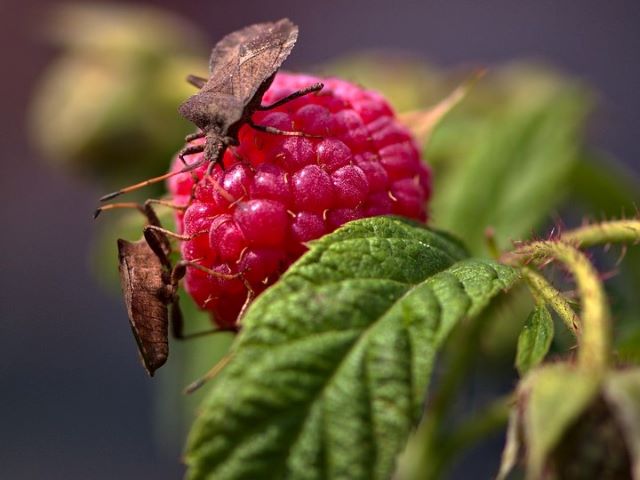
Stink bugs with their shield-shaped bodies and horrible smell can be a problem for raspberry plants. You can get rid of them naturally by using one of the methods we’ve written about in our article Natural Remedies To Remove Stink Bugs From Citrus Trees.
Pest Tips
For some general pest tips: most garden pests hate the smell of mint. It’s a natural deterrent for many small insects and other pests. Planting mint near your raspberries may help you fight off pests.
Additionally, ladybugs are a non-harmful insect that will help fight off other pests. Consider introducing ladybugs into your raspberry garden to prevent pests from taking hold.
Conclusion
So, those are the most common issues that you may face with raspberry plants dying. As you can see, most of them can be prevented or successfully treated. I hope this article helps you identify the problem with your own raspberry plant. And provides you with a solution for helping your raspberry plant to once again produce a thriving harvest of raspberries.
What’s more, when you do have a healthy harvest of raspberries, you might like to make your own delicious Raspberry and Lime No-Churn Ice Cream Recipe.
Further Reading:
- Why Are My Raspberries Not Ripening? Answers and Solutions!
- How Long Do Raspberries Last? (And How To Store Them)
- Why Is My Rhubarb Dying? Causes and Solutions
- How To Grow Strawberries At Home – Ultimate Growing Guide
- How To Grow Blueberries: Planting, Caring and Harvesting
- Tamarillo Tree Leaves Turning Yellow: Causes And Solutions
- What’s Eating My Strawberries? Answered!
